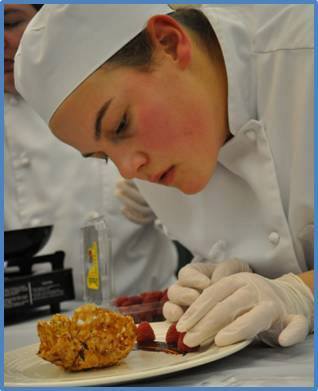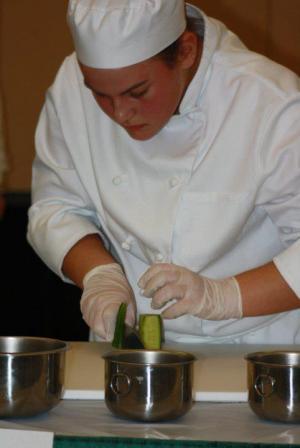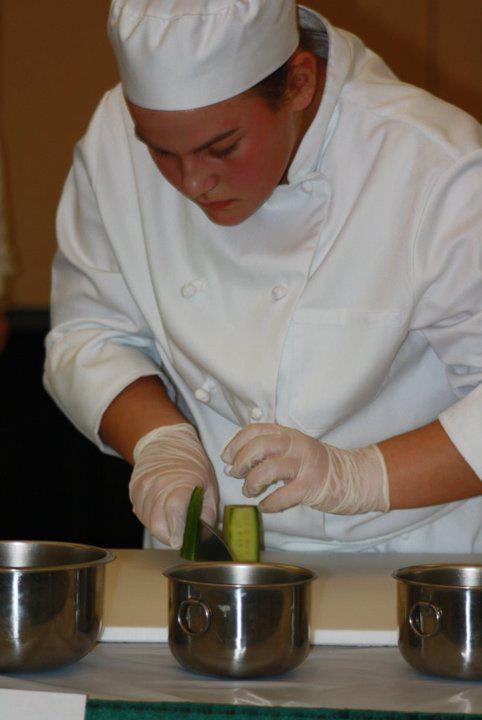Watauga Democrat – Appalachian State University senior Emily Haas stepped up confidently in front of 400 people in Greensboro recently and started talking about her dream.
 Dressed in a white chef's coat, she delivered a polished pitch for FoodU, a program to educate middle schoolers and high schoolers about healthy eating and nutrition, reducing obesity and improving health. It would also create jobs for food educators in Watauga County and, if it goes to scale, throughout Western North Carolina. The judges of the 2016 UNC Social Entrepreneurship Conference were impressed, and all of North Carolina should be encouraged.
Dressed in a white chef's coat, she delivered a polished pitch for FoodU, a program to educate middle schoolers and high schoolers about healthy eating and nutrition, reducing obesity and improving health. It would also create jobs for food educators in Watauga County and, if it goes to scale, throughout Western North Carolina. The judges of the 2016 UNC Social Entrepreneurship Conference were impressed, and all of North Carolina should be encouraged.
In students such as Emily, we can begin to see a solution to the kind of long-range challenges facing the county, the region and the state. And, we get a hopeful glimpse of an otherwise worrying future.
A new study by N.C. State economist Mike Walden predicts as many as 1 million jobs across the state could be eliminated in the next 25 years as computers and robots replace human minds and hands. The map comes with a county-by-county map that highlights which places are most at risk of disruption (https://iei.ncsu.edu/disruptionindex/), and Watauga County is right at the top.
According to Walden, as many as 41 percent of the current jobs in the county could disappear during the next 25 years, with cashiers and waitresses, salespeople, bookkeepers, security guards and even truck drivers replaced by cheaper computing and robotics. Add it up, and that's almost 10,000 jobs and about $240 million in lost wages — just in Watauga County.
A lot of really dedicated people spent time a couple of weeks ago at the Emerging Issues Forum in Raleigh trying to imagine what that future will look like, and how we can create the next generation of jobs. No one is quite sure what those jobs will be, or what precise mix of skills and knowledge will be best. Fran O'Sullivan, IBM's senior executive in North Carolina, described the challenge this way: "How do we prepare students for jobs that don't exist using technologies that haven't been invented yet?"
Solving that riddle will mean graduating more people with a mix of creativity, hard knowledge and technological savvy. We need deep skills in some key areas, but also broad thinking that allows us to apply new solutions to emerging problems.
How do students acquire that kind of diverse talent and figure out how to apply it? Practice. Lots of practice.
Emily's idea was one of 47 pitched by students from every UNC school. Listening to the proposals, I got a glimpse at some of the young people charged with inventing our collective future, figuring out how to help their communities prepare for the coming change.
There were new ideas for education, for teaching entrepreneurship and boosting interest in math, science and technology. We heard a pitch for indoor farming and outdoor solar heating. We heard creative ways to reduce credit card debt, increase voting, improve fitness. And everyone had a business plan to get their idea off the ground.
Emily, like all of the participants, faced a barrage of questions — what was her backup plan if funding fell through? How would she get busy students to participate in health and nutrition classes? Could she partner with private companies? How quickly could she take the plan to scale?
In the end, Emily didn't win the competition, but that's not slowing her down. She recently launched a test of the program at Hardin Park Elementary, and she's having conversations with the North Carolina Restaurant and Lodging Association about funding. Along the way, she is learning the skills more of our students will need if we are going to create 10,000 new jobs — or a million. We don't need an entire generation of super-entrepreneurs. But we do need a generation that's ready to create and perform jobs that don't exist yet using technology that hasn't been invented yet.
Celebrating Emily's dream is definitely a start.
By Leslie Boney, vice president for International, Community and Economic Engagement, UNC General Administration.

